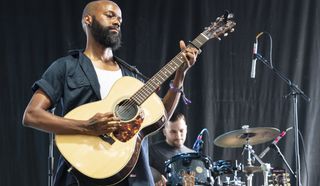“People come up to me and say, ‘Man, you’re keeping the blues alive!’ I’m like, ‘You don’t even know that’s the worst thing you could say to me’”: Mixing Blind Willie Johnson covers with Slayer-inspired shred, Buffalo Nichols is no blues traditionalist
He avoids pentatonic cliches at all costs and thinks too many solos are “a problem in the blues” – now Buffalo Nichols is taking the genre in radical new directions with the help of heavily effected resonators and his “secret tuning”

Since the release of his self-titled debut in 2021, Carl “Buffalo” Nichols has heard a certain phrase a few more times than he perhaps might care to.
“I get people coming up to me and saying, ‘Oh man, you’re keeping the blues alive!’ and I’m like, ‘You don’t even know that that’s the worst thing you could say to me,’” he chuckles, speaking to Guitar World from a rest stop in the early stages of an extensive US tour in support of his sophomore studio effort, The Fatalist.
Sure, his darkly honest storytelling style tips its hat to the great blues originators – the new album’s lead single is a reimagining of Blind Willie Johnson’s You’re Gonna Need Somebody On Your Bond, complete with Charlie Patton vocal samples, after all. But Nichols is by no means in the business of preservation.
Full of programmed beats, woozy synths and other electronic elements alongside Nichols’ otherwise rootsy palette of resonators and fingerpicked acoustics, The Fatalist hits a little differently than your average “blues” record.
“Being considered a blues musician is something I’m trying to work against,” he explains earnestly, having grown up on a varied sonic diet of everything from flamenco, jazz, and West African music to metal and punk. “I wanted to do some things that maybe upset the traditionalists, or at least proved wrong the people who considered me a traditionalist, because I’m not at all.”
As such, the acoustic slide stylings of The Fatalist Blues are backed by a trap beat and an almost subsonic rumble of a bassline, while traditional bluegrass instrumentation dances with a computerized pulse on The Long Journey Home.
Elsewhere, deftly deployed natural harmonics ping out of the mix amid classic slide tones and sweet fingerpicking on songs like Love Is All and the aforementioned take on Blind Willie’s gospel blues classic.
Get The Pick Newsletter
All the latest guitar news, interviews, lessons, reviews, deals and more, direct to your inbox!
“I try to do things that are interesting, but I also try to avoid the blues cliches,” stresses Nichols. “I think harmonics sound kind of silly and they’re lighthearted when the song is a little bit heavier.”
Mattias Eklundh is the person who – through YouTube – introduced me to the big, broader concept of harmonics and how you can find them in pretty much every fret
“I’ve listened to a lot of Freak Kitchen in my life,” proving his proclivity for eclectic and somewhat unexpected influences. “Mattias Eklundh is the person who – through YouTube – introduced me to the big, broader concept of harmonics and how you can find them in pretty much every fret. So, I’ve always been looking for those little secret sounds in the guitar. Open harmonics are the obvious ones, but to do that while you’re playing slide is a little bit outside of the box.”
Nichols’ outside-the-box thinking also extends to tunings, and although he uses common blues favorites like open D and open G, he also has “a secret tuning” that he’s keeping closely guarded. The principle of why he uses it, however, is fair game. “When you’re in an open tuning you can’t really go wrong,” he explains. “You could just slap the guitar and it'd sound cool, so it really opens you up to trying new things.”

It’s an explorative approach that often comes most naturally to those who were self-taught in the first place, and Nichols is no exception, having never had any formal guitar lessons. “At some point, you kind of have to get other people out of your head,” he suggests, “and if you never had anybody in there telling you what you’re supposed to do, it’s a lot easier to just be yourself.”
For every idiosyncratic quirk in his approach, Nichols has handfuls of traditional techniques under his command, too. “I do a lot of bluegrass flatpicking, I play regular picking and strumming,” he tells us. “I play with a thumb pick and I also flatpick with a thumb pick, so I can go back and forth pretty easily.”
Even with my first album, I didn’t want to do guitar solos because I feel like it’s kind of a problem in the blues – too many solos
Although it’s something he’s becoming increasingly well-known for, Nichols confesses that “fingerpicking is actually relatively new” to him, and that his two albums have represented on-the-job practice to some degree.
One thing you won’t find in his recordings is gratuitous blues soloing – though you may get to see Nichols whip out a little Slayer-inspired shred or the occasional tapping lick in one of his live sets.
“Even with my first album, I didn’t want to do guitar solos because I feel like it’s kind of a problem in the blues – too many solos,” he says with a wry smile, having never been a fan of the kind of blues rock figures that have enjoyed mainstream popularity since the ‘80s. Instead, he insists that his priority is always “to focus on the songs.”
His go-to guitars for songwriting and performance are predominantly made by Recording King, and he uses a Tricone Resonator, a parlor guitar, and a concert body acoustic from their range. Also in his arsenal is a Mule Mavis solid-body resonator, which came his way via an Instagram interaction with Mule boss, Matt Eich.
“He’s been really supportive and he’s got his ear to the ground for guitar players,” enthuses Nichols. “I got pretty lucky because he had nothing to gain from me playing his guitars at the time – or even now relatively – but he seems like a real good person.”
Currently one of the most sought-after manufacturers of contemporary resos, the Mule brand seems particularly fitting for a player like Nichols because it pitches its instruments as not just being for traditional slide or blues music, although that’s clearly in their DNA. As Eich put it in a recent blog post: “They are unique musical tools capable of waking up your ear and inspiring new musical choices.”

Nichols has also adopted modern gear with open arms elsewhere in what he describes as his “very complicated” live rig. “I use amp modelers sometimes. I used the Boss GT-1000 for a long time and I just started using the Universal Audio amp pedals and a bunch of different things,” he begins.
“Now, I'm kind of going back to amps – I use solid-state, just because I like to be different. My amp situation is always weird and I have too many pedals – they all just end up sounding the same anyway!”
His resonators – which are all fitted with single coils – are played “heavily effected” with delays, distortion, and reverb to fill out the sound, while he keeps his acoustic guitars “pretty direct and dry as a contrast.”
“I switch over to the acoustic to show people that I actually can play guitar if I want to,” he says, breaking out that same wry smile once again.
- The Fatalist is available now via Fat Possum.

Thank you for reading 5 articles this month**
Join now for unlimited access
US pricing $3.99 per month or $39.00 per year
UK pricing £2.99 per month or £29.00 per year
Europe pricing €3.49 per month or €34.00 per year
*Read 5 free articles per month without a subscription
Since graduating university with a degree in English, Ellie has spent the last decade working in a variety of media, marketing and live events roles. As well as being a regular contributor to Total Guitar, MusicRadar and GuitarWorld.com, she currently heads up the marketing team of a mid-scale venue in the south-west of England. She started dabbling with guitars around the age of seven and has been borderline obsessed ever since. She has a particular fascination with alternate tunings, is forever hunting for the perfect slide for the smaller-handed guitarist, and derives a sadistic pleasure from bothering her drummer mates with a preference for “f**king wonky” time signatures.

“He got a kidney infection, so he’s in hospital… That’s a bit of a drag, because he was going to be the lead guitarist”: The iconic charity rock song that missed out on its star guitarist due to illness – and why it could have sounded very different

“There are better players, better lyricists, better songwriters – but there’s an energy to their combined powers that is hard to rival at the moment”: The best guitar albums of 2024
Most Popular








